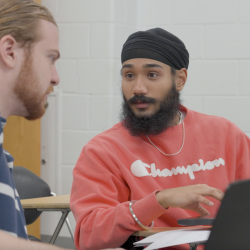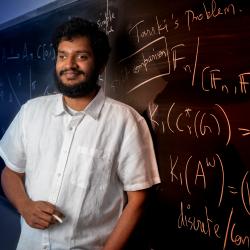Mathematics Professor Konstantina Trivisa Named Director of UMD’s Institute for Physical Science and Technology
University of Maryland Mathematics Professor Konstantina Trivisa has been named director of the university’s Institute for Physical Science and Technology (IPST) for a one-year term, effective July 1, 2020. She replaces Wolfgang Losert, who served as interim director for the past year.
“Konstantina has a strong record as an educator and researcher,” said Amitabh Varshney, dean of UMD’s College of Computer, Mathematical, and Natural Sciences. “As a researcher whose work crosses disciplines and frequently bridges the biological and physical sciences, she will be a great leader for IPST.”
IPST’s mission is to pursue interdisciplinary research and education in emerging areas at the boundaries between physics, chemistry, the mathematical and life sciences, and engineering.
“It is a great honor,” said Trivisa, who has served as associate director of IPST since 2014. “In these unprecedented times, when everything is changing, the interdisciplinary role of IPST and its world-class faculty will keep our college and university at the forefront of scientific discovery and education.”
IPST supports interdisciplinary graduate degree programs at UMD in chemical physics, biophysics and applied mathematics, as well as two National Science Foundation (NSF) funded graduate research training programs: UMD’s node of the international Physics of Living Systems (PoLS) student research network and the Computation and Mathematics for Biological Networks (COMBINE) research traineeship program in network biology. The institute also supports the Burgers Program for Fluid Dynamics and the NCI-UMD Partnership for Integrative Cancer Research.
“Some of my immediate goals will be to help catalyze a vibrant new interdisciplinary research direction that will engage IPST faculty from several of our participating academic units, increase our fundraising efforts, and pursue new cross-sector partnerships while strengthening existing ones,” Trivisa said.
Trivisa’s own research aims to provide an answer to this fundamental question: Given the complexity of nonlinear systems that arise in physical applications, how can one construct suitable approximating schemes that converge and provide the best approximation of those nonlinear systems? She also works on validating models by connecting theoretical results and simulations with experimental observations. The long-term goal of Trivisa’s research is to construct predictive models that accurately capture the evolution of fluids in various physical regimes or the evolution of cancerous cells and drug efficacy to optimize treatments.
Since joining UMD in 2000 as an assistant professor, Trivisa has won several awards for her research, including a Sloan Research Fellowship, the Presidential Early Career Award for Scientists and Engineers, an NSF Faculty Early Career Development award, and a Simons Foundation Fellowship. She was also selected as an ADVANCE Professor and Leadership Fellow at UMD for her work on issues of diversity and inclusion. She has advised over 20 graduate students and postdoctoral fellows at UMD.
Trivisa has held a joint appointment in IPST since 2008 and in the Center for Scientific Computation and Mathematical Modeling since 2017. She served as director of the Applied Mathematics, and Statistics, and Scientific Computation graduate program from 2007 to 2018. In 2018, she received an Outstanding Director of Graduate Studies award from the university.
She received her bachelor’s degree in mathematics from the University of Patras in Greece in 1990, and her master’s and Ph.D. in applied mathematics from Brown University in 1992 and 1996, respectively.








